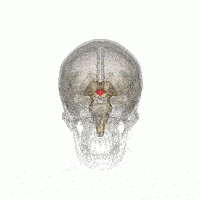The Mental Magic of Running
Many people pick up running for its physical benefits, but they stay for the “mental magic.” What explains the clear thinking and sweet mood boosts of a great run? Here we explore science behind the mental benefits of running.
Running Builds Your Brain
Scientists used to believe that our brain cell counts were limited. This is why teachers warned us against sniffing Wite-Out and permanent markers. If fumes killed off some neurons, we were doomed! But scientists now know that new brain cells sprout in adulthood — and running encourages their growth.
Your brain, just like your biceps and quads, will naturally shrink with age. Running works against this shrinkage by triggering neurogenesis: the growth of new brain cells. In fact, physically active adults over 65 have 2% greater brain mass on average compared with sedentary adults their age. Aerobic exercise reverses the brain’s deterioration.
We still shouldn’t sniff office products. But neurogenesis from exercise has been detected in different parts of the brain, and it helps explain the mental benefits of running. Here are examples.
Hippocampus

Credit: wikipedia.org
Each side of your brain has a seahorse-shaped structure called a hippocampus. These are tied to memory and learning. How do we know? If both hippocampi became damaged in an accident, one result could be amnesia. Another could be the inability to form new memories. And when people have memory loss tied to Alzheimer’s or other dementia, the hippocampi are among the first parts of the brain to show physical change and general information processing. Running for just 20 minutes can spark relevant neurogenesis in the hippocampus. In fact, immediately after exercise could be your brain’s best time to learn new vocabulary words or memorize facts.
Hypothalamus

Credit: wikipedia.org
The hypothalamus is an almond-sized structure at the lower middle of your brain. It has huge implications for physical fitness: This tiny control center regulates hunger, thirst, metabolism, fatigue and more.
When exercise sparks growth in the hypothalamus, what happens? One effect is that neurons are better sensitized to the fact that we’ve already eaten. In other words they can more readily provide a sense of fullness or satiety… so with regular aerobic exercise your brain will be less inclined to help you overeat! Another possible effect is a faster metabolism. Neurogenesis suggests that a slow metabolism isn’t necessarily set in the womb; you can help rewire it with aerobic training.
Investigations into exercise and new brain cells have only just begun. The potential is exciting, as we seem to form thousands of new brain cells every day — and the counts are higher if we keep running.
Next we look at “Miracle-Gro for the brain” and other substances behind mental benefits of running.
Running Releases “Miracle-Gro for the Brain”
Our oldest ancestors probably didn’t jog for pleasure and fitness. After all, when our bodies run, our brains respond as if the situation is dire. This helps explain mental benefits of running even when we aren’t being chased.
When your run begins, your brain releases a protein associated with clear thought. Officially it’s called BDNF or brain-derived neurotrophic factor. Unofficially it’s been called “Miracle-Gro for the brain.” Basically it helps your mind process information more clearly. It helps you make logical decisions.
While BDNF helps explain clarity during exercise, regular running also seems to boost your brain’s stock of glycogen (a carbohydrate) for anytime use. With more glycogen readily accessible, your cognitive function can be generally improved even when you’re at rest.
A few minutes of high intensity training per workout can make a big difference to BDNF levels. If your body can handle drama but you usually just take long walks, try mixing two three-minute sets of running into your routine for a potent mental benefit. As explained below, your clearer mind will also be open to a brighter mood.
Running Activates Your Personal Pharmacy
Some people believe that our bodies can cure themselves of just about anything, if only our brains are properly triggered. We do seem to have “inner pharmacists” supplying specific natural drugs when we run. These help explain the connection between running and mental well-being.
Catching a Runner’s High
Endorphins explain the “runner’s high” — that rush of ecstasy you feel when a long run is through. Endorphins are literally your body’s natural opiates. They exist to dull your pain; they attach to the same receptors that can hold illicit or prescribed opiates; and they also bring a mood boost. With enough aerobic exercise on a regular basis, many patients have reduced their need for potentially dangerous and expensive pain medication.
How hard do you need to train for the endorphin benefit? Your body can get a significant long-lasting rush with about 30 minutes of running.
Chasing the Blues Away
Neurotransmitters are another key to the mental benefits of running. These chemicals are messengers; they help brain cells send messages to each other and to cells throughout your body. Imbalances are common and help explain depression, anxiety and other mental health issues. Running can help bring a balance that boosts your mood for long after exercise.
Neurotransmitters that get a boost from running include dopamine, norepinephrine (pronounced NOR-ep-ih-NEF-rin) and serotonin. All three are tied to feelings of well-being or pleasure and have other benefits. For example, dopamine also supports motivation; norepinephrine increases alertness; and serotonin helps us judge the availability of resources.
The most common antidepressant drugs work on these same brain chemicals. The drug Wellbutrin, for instance, regulates dopamine and norepinephrine. The most commonly prescribed antidepressants were designed with serotonin in mind but also seem to influence the availability of dopamine. Brand names include Celexa, Lexapro, Paxil, Prozac and Zoloft… so we weren’t kidding. Your mind is like a pharmacy. Running helps ensure that you’ll have the right chemicals in stock.
The Finish Line
The brain is mysterious and will always seem magical… yet it’s orderly and logical. It follows chemical laws and responds to physical exercise. Scientists only understand a small fraction of how and why running helps the mind as it whips you into shape, but the mental benefits are valuable and undeniable. When you choose a love affair with running, you get the whole package. Enjoy the high!
Other Treadmill Reviews:
- Test HomePage
- NordicTrack Commercial X14i
- Echelon Stride
- NordicTrack C 590 Pro
- NordicTrack T 7.5 S - Pros & Cons (2024)
- Sole TD80 Treadmill Desk
- NordicTrack Commercial X11i
- NordicTrack T 8.5 S - Pros & Cons (2024)
- Horizon Elite T5
- Exerpeutic TF1000
- NordicTrack T 6.5 S - Pros & Cons (2024)
- ProForm Sport 5.0
- ProForm Premier 900
- ProForm ZT6
- NordicTrack FreeStride Trainer FS5i (Discontinued)
- Bowflex Max Trainer M5
- BowFlex TreadClimber TC100
- ProForm Power 795
- ProForm Sport 7.0
- NordicTrack Incline Trainer X15i
- NordicTrack C 1650 Treadmill
- Horizon Elite T9
- Official Boston Marathon Treadmill 4.0
- NordicTrack Treadmill Desk
- NordicTrack C 1630 Pro
- NordicTrack C 970 PRO
- Bowflex TC20 TreadClimber


2 Comments